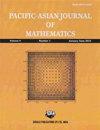模素数半群轨道的大小
IF 0.7
3区 数学
Q2 MATHEMATICS
引用次数: 1
摘要
本文章由计算机程序翻译,如有差异,请以英文原文为准。
The size of semigroup orbits modulo primes
Let $V$ be a projective variety defined over a number field $K$, let $S$ be a polarized set of endomorphisms of $V$ all defined over $K$, and let $P\in V(K)$. For each prime $\mathfrak{p}$ of $K$, let $m_{\mathfrak{p}}(S,P)$ denote the number of points in the orbit of $P\bmod\mathfrak{p}$ for the semigroup of maps generated by $S$. Under suitable hypotheses on $S$ and $P$, we prove an analytic estimate for $m_{\mathfrak{p}}(S,P)$ and use it to show that the set of primes for which $m_{\mathfrak{p}}(S,P)$ grows subexponentially as a function of $\operatorname{\mathsf{N}}_{K/\mathbb{Q}}\mathfrak{p}$ is a set of density zero. For $V=\mathbb{P}^1$ we show that this holds for a generic set of maps $S$ provided that at least two of the maps in $S$ have degree at least four.
求助全文
通过发布文献求助,成功后即可免费获取论文全文。
去求助
来源期刊
CiteScore
1.30
自引率
0.00%
发文量
93
审稿时长
4-8 weeks
期刊介绍:
Founded in 1951, PJM has published mathematics research for more than 60 years. PJM is run by mathematicians from the Pacific Rim. PJM aims to publish high-quality articles in all branches of mathematics, at low cost to libraries and individuals. The Pacific Journal of Mathematics is incorporated as a 501(c)(3) California nonprofit.

 求助内容:
求助内容: 应助结果提醒方式:
应助结果提醒方式:


